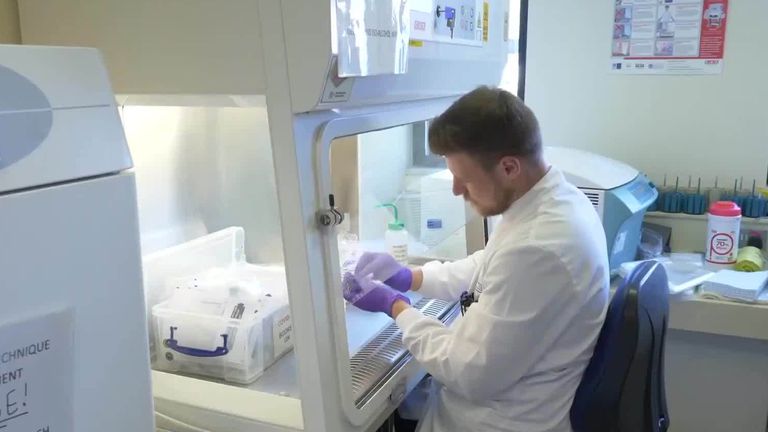Coronavirus: Doctors, carers and children getting COVID-19 at same rate as everyone else - ONS
In its latest set of figures, the Office for National Statistics also says men do not get infected at a faster rate than women.
Thursday 21 May 2020 13:22, UK
Doctors, nurses, care home workers and children have been testing positive for coronavirus at the same rate as the general population in England, according to the Office for National Statistics (ONS).
It has estimated that 0.24% of those looking after patients or residents, including doctors, nurses and carers, tested positive for coronavirus between 4 and 17 May.
The proportion of people getting a positive result who did not work in such roles was also 0.24%.
It is a markedly different result to the one the ONS reported last week, when it said that 1.33% of people in health and care roles had tested positive, compared with 0.22% of those in different jobs, between 27 April and 10 May.
In its latest update, the ONS also said there is no evidence for a higher level of infection in men, who are more likely to die with COVID-19.
It reported that 0.26% of women and 0.21% of men are estimated to have tested positive in England between 4 and 17 May.
There is also no evidence of differences in the proportions testing positive between the age categories 2 to 11, 12 to 19, 20 to 49, 50 to 69 and 70 years and over.
All of the figures refer to private household tests and exclude infections reported in "hospitals, care homes or other institutional settings".
Data was taken from tests performed on 14,599 people in 7,054 homes.
The ONS estimated that at any given time in the latest study period, an "average of 0.25% of the community population had COVID-19". Again, that refers to private households.
It equates to 137,000 people in England - down from last week's estimate of 148,000.
"There were an estimated 61,000 new COVID-19 infections per week in England," the ONS said.
"The incidence rate per week was 0.11 new cases per 100 people."
It is producing its survey in partnership with the University of Oxford, the University of Manchester, Public Health England and the Wellcome Trust.
It is also running a larger, long-term study tracking the spread of COVID-19 in the general population, including up to 300,000 people.
That analysis will include antibody testing to see how many people have had the virus.





